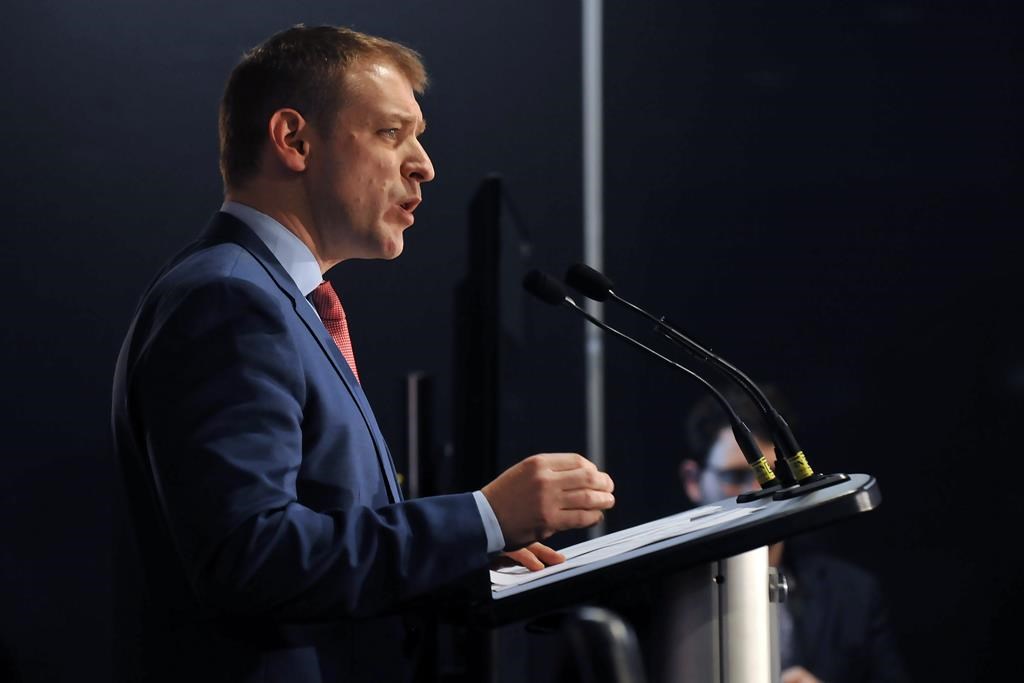Despite a grim economic outlook, the budget tabled Wednesday by the Newfoundland and Labrador minority Liberal government is unlikely to trigger an election.

The budget forecasts a $1.84-billion deficit and a staggering net debt of $16.4 billion – which works out to more than $31,000 per person in the province – but both Progressive Conservative Leader Ches Crosbie and NDP Leader Alison Coffin say they’re not planning to vote it down.
“The population of the province does not want an election. What they want at the moment is they want to be kept safe . . . and they also want economic stability,” Crosbie said. “Upsetting the budget, causing a general election, would not do that. It would undermine all that.”
Besides, he said, most of the spending pitched in the budget has already happened.
Wednesday’s budget arrived in the middle of the fiscal year because of pandemic-related delays. It’s the first budget tabled by a newly-arranged government led by surgeon Andrew Furey.
Furey has not yet won a seat in the Newfoundland and Labrador legislature, but he’s running for a spot in a byelection next week in the Humber-Gros Morne district. A provincial election has to happen some time before August 2021, but it’s not yet clear when it might occur.

Get breaking National news
Whoever wins will inherit a difficult financial situation.
The deficit announced in Wednesday’s budget was $309 million smaller than the $2.1-billion deficit forecasted in July, largely due to unexpected pandemic money from the Canadian government and a bump in oil prices. Even so, the budget lists an anticipated $430-million drop in oil revenues from the previous fiscal year.

The government forecasts it will borrow $3 billion this fiscal year, up from $1.2 billion last year. Though $3 billion is a “huge number,” Finance Minister Siobhan Coady said, it’s less than her department anticipated this summer.
“From a budgeting perspective, I think this is a very responsible budget, especially in the middle of a pandemic,” Coady said.
The budget does not factor in the federal government’s recent announcement of $320 million to help the province’s struggling offshore oil sector. The industry has been plagued by project delays and suspensions, including the indefinite delay of Equinor’s Bay du Nord project, slated to be the first deep water project in the Newfoundland and Labrador offshore. Husky Energy also recently announced it was reviewing its plans for the $2.2-billion West White Rose project as well as its operations in the province.
- Read the full transcript of Carney’s speech to World Economic Forum
- ‘Nobody should be above the law’: Former justice ministers criticize UCP for ‘unacceptable’ conduct
- Canada’s TikTok operations ban overturned by Federal Court
- NATO faces ‘test’ on Arctic security, Carney and Rutte say in Davos meeting
Offshore oil royalties account for 7.5 per cent of provincial revenues in the budget, with a forecasted oil price of $39 per barrel.
That figure reflects the current volatility in the global oil market, said Natural Resources Minister Andrew Parsons. “That’s the situation we find ourselves in. It’s one thing when you have government policy that stifles development, but this has nothing to do with government policy,” he said.
The budget sets aside $3 million to launch a $25-a-day daycare program which Education Minister Tom Osborne said will begin in early 2021, as well as $16.4 million toward the construction of an adult mental health and addictions facility in St. John’s.
Coffin said she would have liked to have seen money for better internet services across the province, especially as the budget set aside $20 million for laptop purchases for students.
Crosbie said he’s particularly concerned about the anticipated drop in the employment rate of nearly six per cent. That translates to about 13,000 lost jobs, he said.
The budget covers just six months of expenses and revenues and comes without a forecast for future years. Coady said that without a federal budget, it’s difficult to make forecasts beyond next spring.
This report by The Canadian Press was first published Sept. 30, 2020.







Comments